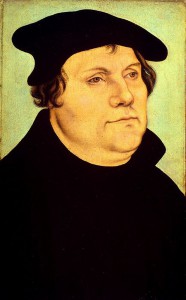
… traditional Protestant and Catholic teaching has presented the self-sacrifice of Christ as the payment of a debt to God the Father. In this view, human sinfulness created a debt which simply had to be settled, but could not be repaid by humanity because of its fallen state; so the Son of God stepped in and took care of that vast obligation. For Orthodox theologians, this wrongly portrays God the Father as a sort of heavenly debt-collector who is himself constrained by some iron necessity; they prefer to see the passion story as an act of mercy by a God who is free. Over-simplifying only a little, Mr Fraser observed: “the idea that the cross is some sort of cosmic pay-back for human sin [reflects] a no-pain-no-gain obsession with suffering,” from an eastern Christian viewpoint.
Erasmus rightly describes this sort of thinking as a gross simplification. He quotes the Anglican priest, who said that “capitalism itself was built upon this western model of redemption” and that Angela Merkel is, in a sinister twist, is the daughter of a Lutheran minister. Erasmus:
That last bit is less convincing. Western theories of redemption predate capitalism by many centuries, and devout Orthodox Christians have been keen practitioners of capitalism, whether as bankers and industrialists in the late Ottoman empire or graduates of Harvard Business School. Nor should too much be made of Mrs Merkel’s Lutheran roots. After all, the politicians elected by the happy-go-lucky Catholics of Bavaria regard her as absurdly over-indulgent with the “clowns”, as one put it, who govern Greece. So there is no correlation between Lutheranism and hard-heartedness.
Erasmus also points out that Christians East and West, when assembled in gatherings of organizations such as the World Council of Churches, face no “insuperable” problems when they’re discussing economics. Yes, and of course, at the WCC too often the scapegoat for the world’s ills is the very existence of the market economy, however inadequately they define it.
While there are theological differences in how Christians East and West understand salvation — or as it’s often described in the East as theosis or deification — to ascribe these little understood concepts as the underpinnings of cataclysmic economic and political events is nothing short of preposterous. And could Rev. Fraser explain how a self declared atheist, Alexis Tsipras, got elected as Prime Minister of Greece?
Anyone interested in a very good introduction to Eastern Orthodox theology should pick up Met. Hilarion Alfeyev’s book at SVS Press titled, Orthodox Christianity Volume II : Doctrine and Teaching of the Orthodox Church.

